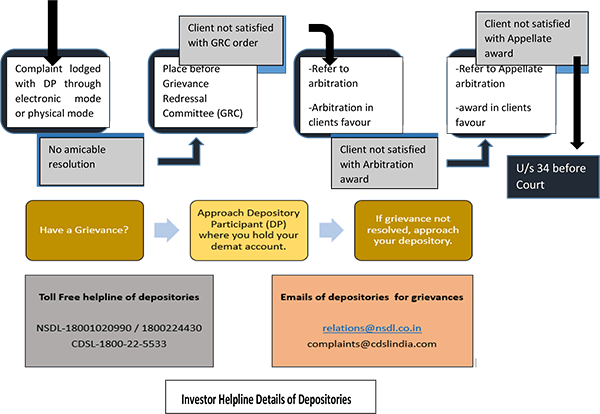So, the stock market is like a big market where people buy and sell tiny pieces of ownership in companies. In India, “the stock market” also known as “the Dalal Street” can refer to the entire ecosphere of securities trading, which includes stock exchanges where the stocks of Indian public companies are listed for sale.
How Does the Stock Market Work?
The stock market is a platform that helps various businesses to raise money to fund their operations by selling a share of their ownership rights in the form of stocks, and it creates and sustains wealth for individual investors.
That means, companies raise money by selling ownership rights to investors & provide them a right to claim a share in the profits of the business.
For example: Imagine that you and your friends want to start a lemonade stand, but you need more money to buy lemons, cups, and other things. So, you decide to ask other people for help.
You make little pieces of paper that say, “I own a part of the lemonade stand” and you sell those pieces of paper to anyone who wants to help you. These pieces of paper are like the stocks in a company. When someone buys a stock, they become a part-owner of the company.
Now, let’s say that your lemonade stand becomes super popular and everyone wants to buy your lemonade. This means that your company is doing really well, and the value of your stocks goes up.
People who bought your stocks earlier can sell them to someone else for a higher price and make a profit. This is like when you trade your toys with your friends for something you want more.
On the other hand, if your lemonade stand isn’t doing well, and nobody wants to buy your lemonade, then the value of your stocks goes down. This means that people who bought your stocks earlier will lose money if they sell them now.
Similarly, in the Indian stock market, people buy and sell stocks of different companies. When a company is doing well, the value of its stocks goes up, and people can make a profit by selling them at a higher price.
And when a company is not doing well, the value of its stocks goes down, and people can lose money if they sell them at a lower price.
Let me give you another example – let’s say there’s a company called “Chai Wala” that makes yummy tea. Chai Wala decides to sell shares of their company to the public through the stock market.
If you buy one share of Chai Wala for ₹100, you now own a tiny piece of the company. If lots of people want to buy shares of Chai Wala, the price of each share might go up to ₹150. If you sell your share at that price, you make a profit of ₹50!
But if the company doesn’t do well and lots of people start selling their shares, the price might go down to ₹75. If you sell your share then, you would lose ₹25.
So, the stock market is like a big marketplace where people can buy and sell pieces of ownership, or “shares,” in companies. It’s like a game where people try to buy low and sell high to make money.
It might look like a fun game of buying and selling, but it can also be risky because it involves your hard-earned money. And the price of the shares can go up and down depending on how well the company is doing.
The Indian Stock Market
Simply speaking – the Indian stock market is a marketplace where shares of publicly traded companies are bought and sold. It’s also known as the Indian equity market.
Now, since there are thousands of companies working in India like Chai Wala, hence Indian stock market exists under a centralized mechanism regulated by a central authority called the Securities and Exchange Board of India (SEBI).
SEBI is responsible for overseeing and regulating the activities of all market participants, such as stock exchanges, brokers, and listed companies.
SEBI plays an important role & ensures that the Indian stock market operates in a fair, transparent, and efficient manner. It sets rules and guidelines for market participants, monitors compliance with those rules, and takes enforcement action against those who violate them.
In addition to SEBI, there are other government bodies and self-regulatory organizations that play a role in regulating the Indian stock market. For example, the Ministry of Finance and the Reserve Bank of India (RBI) also have some regulatory authority over certain aspects of the market.
Major Indian Stock Exchanges
There are two major stock exchanges in India: the Bombay Stock Exchange (BSE) and the National Stock Exchange (NSE). The BSE is the oldest stock exchange in Asia, while the NSE is the largest Indian exchange in terms of market capitalization.
Apart from the BSE and NSE, there are also other stock exchanges in India, such as the Metropolitan Stock Exchange (MSE) and the National Commodity and Derivatives Exchange (NCDEX). These exchanges specialize in trading specific financial instruments, such as commodities and derivatives.
Market Hours
The Indian stock market operates from Monday to Friday, with trading hours starting at 9:15 AM and ending at 3:30 PM Indian Standard Time (IST). There are also pre-market and post-market sessions where traders can place orders before or after regular trading hours.
Factors influencing stock markets
The stock market is influenced by various factors, including economic and political news, company earnings reports, global events, and investment or sentiment. These factors can cause stock prices to fluctuate, and investors need to keep up-to-date with the latest news and trends to make informed investment decisions.
Conclusion
Overall, the Indian stock market is an important part of the country’s economy, providing a platform for businesses to raise capital and for investors to earn returns on their investments.
It operates in a centralized and regulated manner; with various authorities working together to ensure that it remains fair, transparent, and efficient for all market participants.




